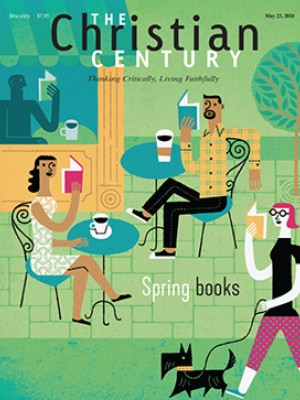June 17, Ordinary 11B (Mark 4:26-34)
My Western side longs for more activity in this parable, but I'm trying to listen to my Eastern side.
Within minutes of redefining the meaning of family (Mark 3:3–35), Jesus tells the crowd around him his first parable, the parable of the sower. Then, drawing his disciples aside, Jesus interprets it: the seed is the word falling on different types of soil that prove either barren or fruitful. Here the sower’s choice of where to sow is critical. The sower stands at the center of the parable.
Jesus then goes on to tell another story. He says: “The kingdom of God is as if someone would scatter seed on the ground, and would sleep and rise night and day, and the seed would sprout and grow, he does not know how . . . But when the grain is ripe, at once he goes in with his sickle, because the harvest has come.”
Read our latest issue or browse back issues.
Compared to the parable of the sower, this story receives little attention, perhaps because it is difficult to know if it is a new parable or simply a continued interpretation of the first. Yet I am struck by how different the two are. In this week’s story, it does not seem to matter where the farmer sows or what he does afterward. Indeed the human role is relatively inactive, unless you count sleeping and dreaming as part of the process of growth. Night and day, the seed grows while humans sleep. The soil, not the human, is the silent but active partner in the seed’s growth.
Having lived my adult life in close relationship with the Chinese American community in San Francisco’s Chinatown, I find this difference intriguing for its contrasting Eastern/Western implications. My immediate response is heavily influenced by my Western upbringing. I want to place myself at the center of the story—to be the sower. I long to do something to help the seed to grow. If I could I would force the seed’s growth by strength of will. My Western linear thinking and goal-oriented approach compels action. So, if not the sower, I would like to be the seed—the fruitful seed, of course, not the seed that falls among rocks or thorns. I want to play an active role in what will happen.
But through years of exposure to Chinese culture I have come to see how this perspective is limited. The second, more Eastern story follows the rhythm of the agricultural seasons, in which change and growth cycle between times that lie fallow and times that burst into abundant harvest. That yin always follows yang, which is once again followed by yin, stands at the center of Chinese philosophy.
Annually, through periods of ordinary and sacred time, the church’s liturgical cycle mirrors the agricultural seasons. In fact, each phase of the liturgical year can be traced back to its origin in an agricultural festival. Through peaks and valleys, births and deaths, in the seasons of our personal and congregational lives, this cycle brings the hope of continual renewal.
Could there be political seasons as well? In these troubled times, I find myself living in a state of constant tension, wanting to do something to precipitate change. But these seem to me to be fallow times. In fallow times, a farming family moves indoors, close to the hearth, for a slower period of quieter activity. These days I am drawn to neither the role of sower nor of seed. So I find some reassurance in this image of seed and soil interacting while we humans sleep. If the kingdom of God is like a seed, it is also like the soil that embraces and blankets the seed, protecting it from the elements through fallow times until its time for fruition has come.
I see myself in that soil, too. I am the land lying in wait, longing for renewal. I am the empty hollow cupped out of earth, a receptacle for the seed. I am the soil transforming dying vegetation into nutrients that will feed new growth. Jan Richardson describes the soil as “the space that waits for the seed, that holds itself in a shimmering emptiness, already loving what it cannot see but aches to enfold.” I hold these seeds in trust till their time has come, till the tiny green shoot of plant erupts from its protective soil to unfold into the blessing of sunlight, rain, and life-giving air. All in God’s time.
This is not a period of complacency, though in contrast to my periods of hectic activity, it might look that way. During barren times, I search endlessly to discern where the seeds of God’s reality have already been planted. It takes work to trust that each seed contains the energy it needs to become whatever it was intended to be. It is not easy to trust that the future is even now waiting to unfold according to God’s promise sealed within it. Admittedly, this more Eastern way of being is not a comfortable mode for me.
I don’t think the parables are meant to be understood, at least not fully. Their many possible meanings allow us the flexibility to apply them to the seasons of our lives. In the cycle of death, transformation, and resurrection, today I am phase one: the soil. I am the earth that dreams of the great green growing time when God’s seeds will rise with the disruptive energy of resurrection, maybe even insurrection. Who knows? Maybe tomorrow I will be the seed falling into the earth only to live again. Or maybe, next time, I will be the sower.




